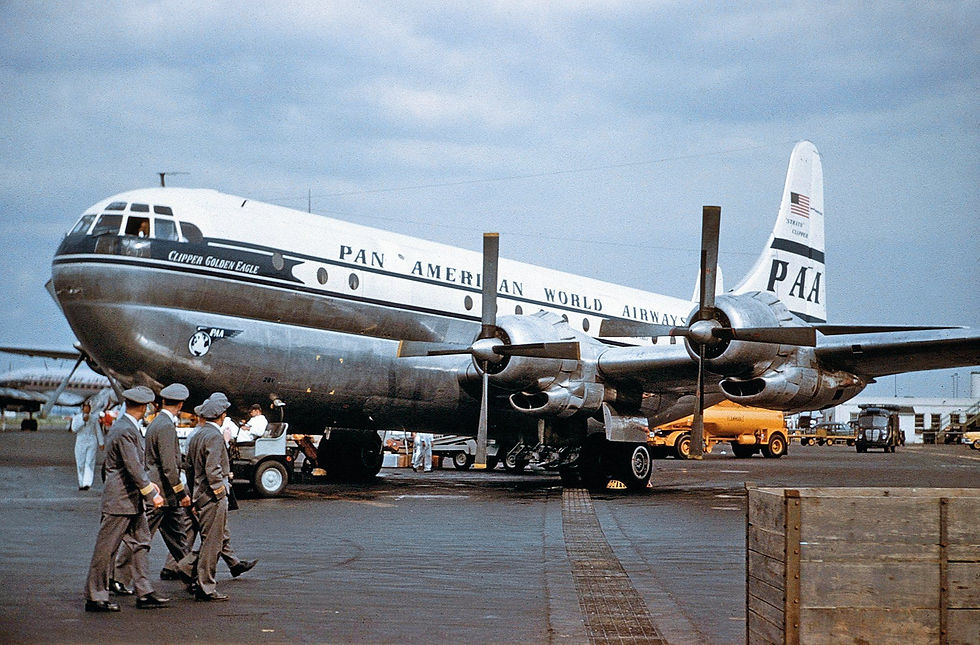Exploring the decline of Boeing and Intel and examining the evolving landscape of U.S. global leadership.

Once synonymous with American innovation, Boeing and Intel were the gold standard in manufacturing and technology. Their expertise and world-class engineering not only led to groundbreaking products but also reinforced the U.S. as a dominant global force in industrial and technological innovation. However, today, both companies are facing profound crises, and their decline signals more than just corporate missteps—it highlights the fragility of America's position in the global economic and technological landscape.
A Blow to U.S. Global Competitiveness
For decades, Boeing was the leader in aerospace, producing cutting-edge aircraft that enabled the U.S. to dominate global aviation. Meanwhile, Intel was the driving force behind semiconductor innovation, powering personal computing, mobile devices, and artificial intelligence systems. The collapse of these two giants doesn't just impact shareholders and employees; it weakens the country's ability to compete with emerging global powers like China in sectors that are critical to national security and global influence.
Both industries—semiconductors and aerospace—are foundational to the U.S. economy and global positioning. In the midst of the U.S.-China geopolitical struggle, where technology and innovation determine future leadership, the downfall of Boeing and Intel puts the U.S. at risk of falling behind in sectors that drive technological advancement. While the U.S. is still home to world-class innovators, its capability to manufacture at scale is rapidly diminishing.

The Decline: Internal Failures, Not External Competition
The crises at Intel and Boeing stem not from foreign competition but from internal mismanagement and flawed strategic choices. Intel's decision to prioritize short-term financial gains over technological leadership led it to pass on manufacturing the chips for Apple's iPhone and delayed its investment in advanced chipmaking technology, allowing competitors like Taiwan Semiconductor Manufacturing Co. (TSMC) to dominate.

Similarly, Boeing’s reliance on software upgrades rather than investing in a full redesign of its aging 737 models contributed to fatal crashes that severely damaged the company's reputation. Outsourcing critical aspects of production and workforce reductions during the pandemic only exacerbated the company’s quality and operational problems. These failures highlight a broader issue: both companies shifted their focus from engineering excellence to prioritizing financial metrics, a move that has proven to be detrimental.
The Geopolitical Stakes: National Security and Economic Sovereignty
The decline of Boeing and Intel has far-reaching implications beyond their industries. In today’s interconnected global economy, advanced technology, semiconductors, and aerospace are vital not just for commercial success but for national security. Without the ability to manufacture semiconductors domestically, the U.S. risks being overly reliant on foreign suppliers, particularly TSMC. Given the rising tensions between China and Taiwan, this dependence places the U.S. in a vulnerable position. Should China succeed in taking control of Taiwan, the entire U.S. tech sector could be at the mercy of Beijing.
Intel is the last major U.S.-based competitor capable of challenging TSMC’s dominance in chip manufacturing. However, with its struggles, the U.S. semiconductor industry is at risk of losing ground to East Asia, where Taiwan, South Korea, and China are making rapid advancements. In the aerospace sector, Boeing's decline paves the way for Airbus and China’s Comac to capture a larger share of the global aircraft market. China’s state-backed Comac is now delivering its C919, a direct competitor to Boeing’s 737, further challenging the U.S. lead in aviation.
Implications for U.S. Manufacturing and Leadership
The loss of manufacturing leadership at Intel and Boeing would ripple through the U.S. economy, affecting not only jobs but also the complex ecosystems of suppliers, innovators, and engineers that depend on these companies. Once an industrial ecosystem moves offshore, it is nearly impossible to bring it back. The expertise and innovation capacity associated with these industries would migrate to other countries, leaving the U.S. lagging behind.
Furthermore, the erosion of U.S. leadership in these critical sectors weakens America's global standing. Countries like China have recognized the importance of investing in strategic industries—from semiconductors to aerospace—and are pouring billions of dollars into these sectors to secure dominance. In contrast, while the U.S. government has made some attempts to address these challenges—such as through the Chips Act, which incentivizes domestic semiconductor production—it may not be enough to regain lost ground without significant, sustained investment in both public and private sectors.

Restoring U.S. Manufacturing Competitiveness
To regain its competitive edge, the U.S. must not only support struggling companies like Boeing and Intel but also foster a broader resurgence of domestic manufacturing. The Chips Act, which encourages companies like TSMC and Samsung to build facilities in the U.S., is a positive step, but more needs to be done. American companies need to prioritize engineering and product development over short-term financial metrics. The long-term viability of U.S. manufacturing depends on producing world-beating products, not just jobs.
Moreover, the U.S. must invest in its workforce and infrastructure to maintain its innovation leadership. Encouraging foreign companies to build roots in the U.S. can drive domestic companies to raise their standards, as seen with Toyota’s influence on the U.S. auto industry in the 1980s. A strategy that blends public support with private sector innovation will be critical to ensuring America’s manufacturing resurgence.

A Call to Action
The struggles of Boeing and Intel are not isolated corporate challenges—they represent a national emergency that threatens to reshape America's role in the global economy. To maintain its leadership in technology and manufacturing, the U.S. must act swiftly to address these crises. Failure to do so could leave the nation increasingly dependent on foreign powers for critical technologies, compromising both its economic future and national security.
In a world where technological innovation and manufacturing capability define global power, the U.S. cannot afford to let its industrial giants fail. Ensuring the recovery and future success of Boeing, Intel, and other American manufacturers is essential to safeguarding America's competitive edge in a rapidly changing global landscape.


Comments